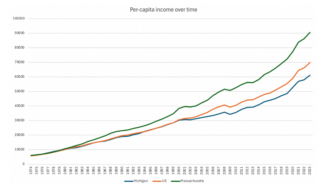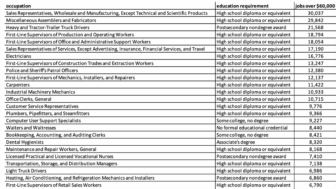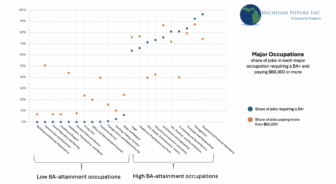
The Michigan Association of United Ways recently reported that in Michigan’s strong pre-pandemic 2019 economy 38 percent of Michigan households were unable to pay for basic necessities. So in what many called the best U.S. and Michigan economy ever, nearly four in ten Michigan households (1.5 million) did not earn enough to pay for housing, child care, food, transportation, health care, and a smartphone plan, plus taxes and a miscellaneous contingency fund equal to 10% of the budget.
The United Way’s definition of basic necessities does not include savings, auto repairs, cable service, travel, laundry costs, or amenities such as holiday gifts or dinner at a restaurant that many families take for granted.
The cost of this basic necessity budget ranges from $23,4000 for a single adult to $64,116 for a household with two adults, one infant and one preschooler.
The United Way data make clear that Michigan’s two-tier economy predates the pandemic. Even when our economy was strong those at the top were doing well, but way too many Michiganders were struggling.
The United Way data also demonstrates that this is an all Michigan problem. Urban, suburban. and rural. Only four Michigan counties had less than 30 percent of households unable to pay for the basics: Livingston, Barry, Midland and Eaton. With Livingston having the fewest struggling households at 24 percent. While five had more that 50 percent: Lake, Alger, Clare, Gogebic and Ontonagan.
And it is a problem across race as well as geography. With 60 of Black households, 48 percent of Latino households, 34 percent of White households and 28 percent of Asian households unable to pay for the basics.
So the reality is that the 2019 Michigan economy was not one of our best ever. It was a two-tier economy. It is far past time that we agree that when 1.5 million Michigan households cannot pay for the basics we do not have a good economy, no matter how low the unemployment rate or how high the stock market. The economy that we should all want is an economy that as it grows benefits all.
The preeminent reason for our two-tier economy is that the economy is producing way too many low-wage jobs. In the strong 2019 Michigan economy 58 percent of jobs paid less than $20 and hour.
Clearly the pandemic has made things worse. As low-wage workers and low-income households have borne the brunt of the pain from the economic lockdown, and are, almost certainly, going to have the slowest recovery as the economy reopens.
The pandemic has made crystal clear that there simply are lots of tasks that need to get done that are structurally low-wage work. Everyday, in every community in Michigan, we are confronted with the vast number of low-wage workers in the leisure, hospitality and personal services industries who have lost their jobs and no longer can make ends meet. As well as those who get us food and prescription drugs and who care for us who are not only putting their lives on the line to serve us but also are struggling to pay for the necessities.
They live paycheck to paycheck not because they are irresponsibly buying “unnecessary” luxuries, but because they are in low-wage jobs that leaves them struggling to pay for the necessities. The reality is that most of those struggling economically, in good times and bad, are hard working Michiganders. Who like us get up every day and work hard to earn a living.
That the prime reason for so many struggling is not irresponsible adults coddled by a too-generous public safety net, but rather an economy, even when it is booming, has too few jobs that pay family-sustaining wages and provides health coverage and paid leave.
This is structural. We are not growing our way out of too many low-wage jobs. The 2019 Michigan economy demonstrated that a low unemployment rate will not drive wages, benefits and hours worked up enough to substantially dent the proportion of struggling Michigan households.
This is the prime economic challenge of our times: having an economy that provides family-sustaining jobs––not just any job––so that all working Michigan households can raise a family and pass on a better opportunity to their children.
We can––and should––debate how to achieve an economy that benefits all. What we should not and cannot ignore is that our economy structurally is leaving too many behind. The first step in solving this problem is to recognize that this is a problem that will not be fixed when the economy starts to grow again. The second step is to change our definition of economic success from a low unemployment rate to a rising household income for all. And then get to work on developing policies and programming explicitly designed to achieve that mission.







